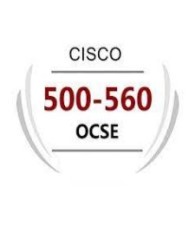Climate change is one of the most existential challenges our world faces today. Every year there is more and more pressure on executives and corporate boards to support sustainability efforts. The… Read more on Cisco Blogs
Climate change is one of the most existential challenges our world faces today. Every year there is more and more pressure on executives and corporate boards to support sustainability efforts. The challenge is not only in setting sustainability goals, but also in following through successfully. Cisco is innovating to help our customers lower emissions, increase energy efficiency, reduce carbon footprint, as well as provide visibility and insights to support our customer’s sustainability initiatives.
Today, companies are thinking about their sustainability efforts as part of a larger strategy for driving business outcomes, accelerating innovation, and creating a competitive edge. IT is playing an increasingly important role in advancing an organization’s sustainability approach. However, developing a strategy and path toward achieving sustainability goals isn’t easy. 80% of business leaders claim that technological innovation will play a significant role in their whole organization’s transformation to a net zero business model, while at the same time 75% of senior IT decision-makers say IT-related emissions are one of the most challenging to improve. Despite a strong commitment to sustainability, most organizations will miss their targets if they do not accelerate the pace of their emissions reductions.
Measuring Carbon Emissions: Scopes 1-3
Cisco has been reporting on sustainability since 2005. As part of our purpose to power an inclusive future for all, we have set ambitious environmental sustainability goals, including a goal to reach net zero greenhouse gas (GHG) emissions across our value chain (Scopes 1, 2, and 3) by 2040. We plan to reach 90% reduction for Scopes 1 and 2 by 2025, and we plan to reduce absolute Scope 3 emissions from purchased goods and services, upstream transportation and distribution, and use of sold products 30% by 2030.
When working towards GHG emissions goals, it’s important to realize that measuring emissions is not the same across all three scopes. Scopes 1 and 2 are considerably easier to quantify and resolve as emissions are either directly or indirectly related to operations owned or managed by the company. Scope 3, on the other hand, can span the company’s entire value chain including third parties. If companies are truly committed to their sustainability goals, they need a strategy and actionable approach that can help solve for these Scope 3 emissions challenges.
Delivering Sustainable Solutions
Cisco is innovating to help customers accelerate their sustainability goals and commitments.
Energy Management. Cisco is unlocking the potential to standardize visibility and insights from the data center to the campus to help our customers accurately measure their emissions. We are embedding energy management capabilities across our portfolio to turn the network into a control plane to measure, monitor, and manage energy.
Connecting power and data with Energy Networking. Cisco is also developing energy networking solutions to help accelerate automation and management of energy consumption for new use cases. Our work connecting power and data to support sustainability is helping to distribute energy more simply and safely.
Cisco is delivering sustainable solutions and offers which can give customers the flexibility and choice to leverage technology one use case at a time.
Data Center Solutions. We are building a foundation for sustainability in data centers that can decrease energy consumption, increase energy efficiency, and provide cloud-managed sustainability. Our solutions support use cases such as cooling efficiency, environmental monitoring, power optimization, and more. As AI demands grow, the demands on the data center infrastructure will require significant upgrades to entire ecosystems and architectures.
Cisco Smart Buildings and Intelligent Workspaces. Our solutions can help customers get insights into their physical space to create a workplace that is safe, smart, and seamless. Customers can address use cases around occupancy, environmental wellness, building controls, and lighting. The ongoing transition to hybrid work is further underpinned by connecting POE across every endpoint and device.
Internet for the Future. Cisco innovation can help Service Providers increase capacity and scalability while reducing energy consumption, space, and maintenance cycles.
Getting Started on the Net Zero Journey
We continue to invest in accelerating sustainability technology across our portfolio through Cisco’s Engineering Sustainability Office. From design to go-to-market, we work directly with our engineering teams to build sustainability into our portfolio roadmaps. We partner with Cisco’s Chief Sustainability Office, Supply Chain, and Legal teams to address evolving energy efficiency and emissions metrics to help our customers on their journey to net zero.
The work we are doing to embed sustainability into the core of our business and our solutions can help our customers make progress toward their own sustainability goals. To successfully move forward, customers need comprehensive visibility — a plan to modernize and measure — and an end-to-end approach to long-term sustainability. Here is how you can get started:
Get maximum visibility. To be successful, you need a way to gain a comprehensive view into your existing emissions footprint and use that as a benchmark to measure your progress. Cisco’s embedded energy management capabilities can give you the help you need to measure your emissions and your carbon footprint.
Modernize and measure. Once you know where you stand, create an action plan to help you progress towards net zero. Cisco can help you modernize your infrastructure to use hardware built using circular design principles. Modernizing your IT infrastructure can help improve performance, increase energy efficiency, and reduce your overall footprint. Once you’ve optimized your IT infrastructure for sustainability, monitor and measure your energy consumption. You can get real-time insights into your network with energy management capabilities embedded in Cisco’s core offerings including Nexus Dashboard, Cisco Intersight, and Cisco IoT and Meraki Sensors.
Build a foundation for end-to-end sustainability. Rethink your strategies around your operations management for IT, OT, and energy networks to focus on automation, energy, and resource efficiency. Reduce your environmental impact end to end by reusing or recycling end-of-use equipment. Cisco offers product lifecycle circular IT programs and services that can help reduce environmental impacts. Cisco reuses or recycles nearly 100% of the equipment that is returned to us.
Together, Cisco’s solutions and our long-standing focus on sustainability can help businesses and IT make choices with an eye towards a more sustainable future. Let’s take the next step toward building a sustainable future together.
For more information best practices for your sustainability journey,
please read our newly published white paper:
CIO/IT Leader Guide: Getting Started on Sustainability
Cisco is innovating to help our customers lower emissions, increase energy efficiency, reduce their carbon footprint, as well as provide visibility and insights to support our customer’s sustainability initiatives. Here are practical steps to getting started on the Net Zero journey. Read More Cisco Blogs











